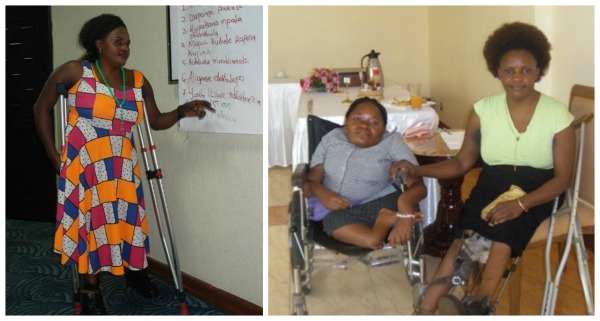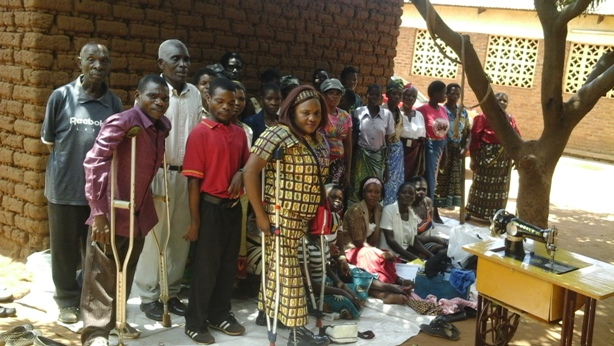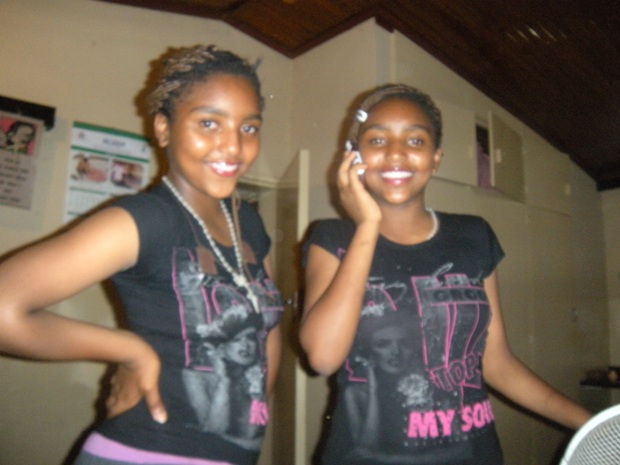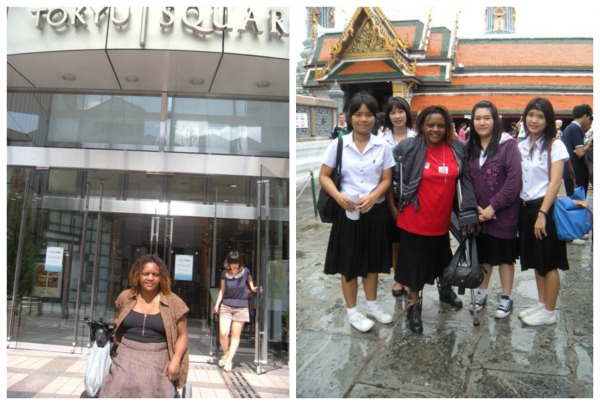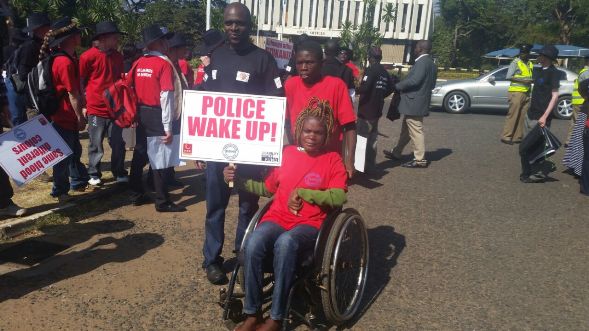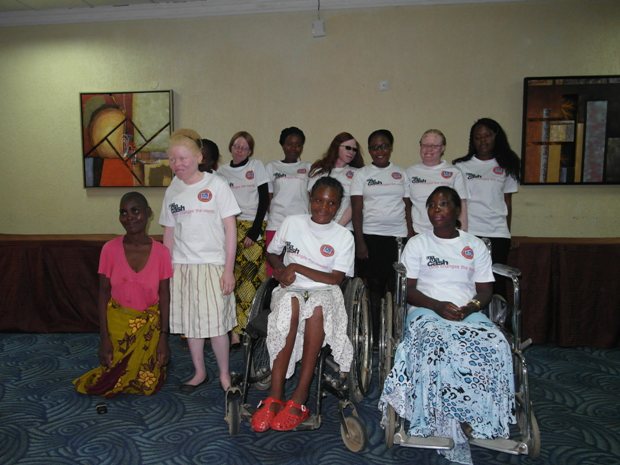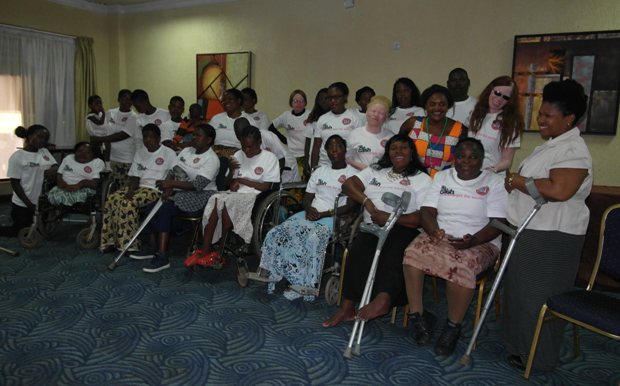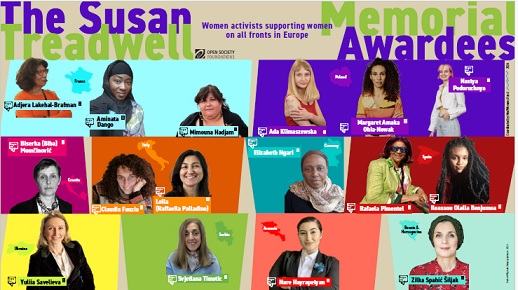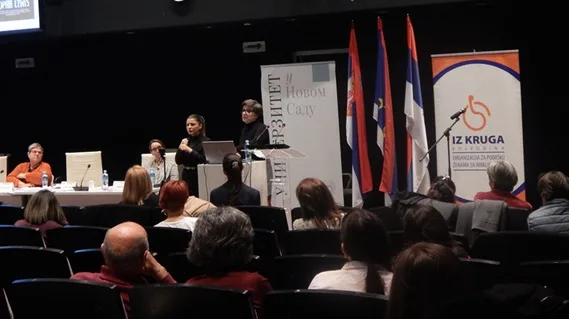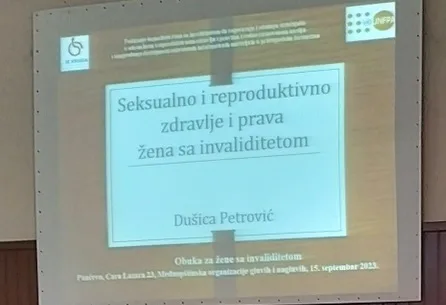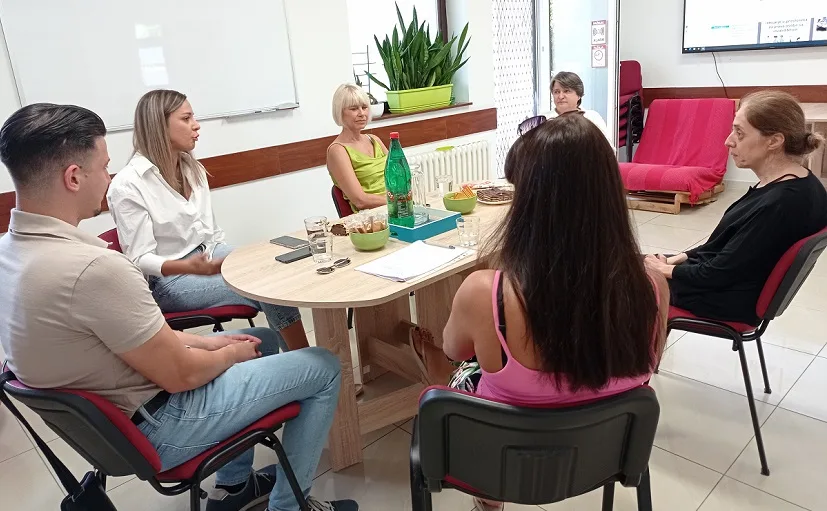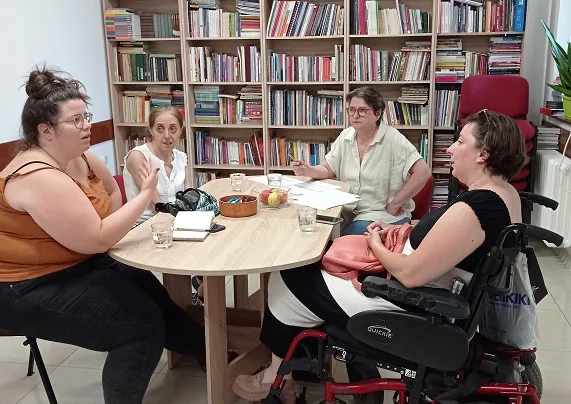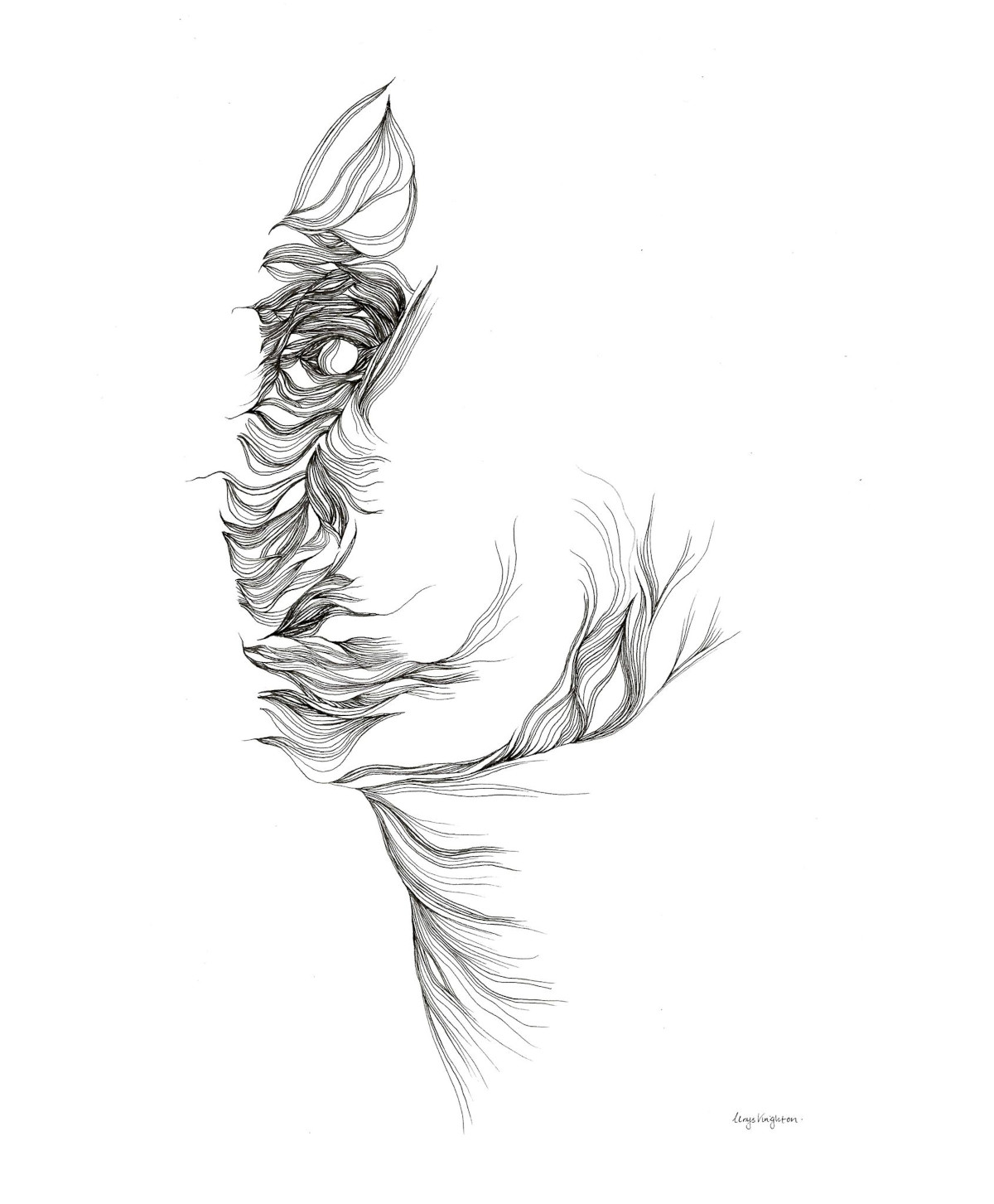Name three most important things about yourself.
I was born without disabilities in a very remote village in the northern part of Malawi where patriarchy system is very crucial. When I was 7 years old I remember I had a splitting headache that led me to lose the use of both my legs and hands. I regained the use of my hands by the grace of God after a year, and I use crutches and calipers in walking. This is, therefore, one significant this in my life
My parents, especially my father, played a great role to make sure I attended mainstream school and most of the time he motivated me by encouraging me. I, therefore, graduated up to college level.
I have three children, all girls. One is 22 years old and the twins are 16 years old, both born from different fathers. This is significant for my story.
Childhood memories – what’s the very first thing you can remember?
I remember walking without any problem, then I had a splitting headache and I fainted. I was taken to witch doctor because where we lived there were a lot of beliefs in one being bewitched. Sometimes I still remember being dug in a pit and putting mad all over my body up to the waist. Part of my body stood there for many, many hours because they wanted my legs to be strong. I remember having no one to play with; this was one of the bitter moments in my childhood. I also remember that at times I could be taken to a witch doctor who could pinch my legs up and randomly asking me if I can feel anything at all, for him to administer the prescribed concoction. After some time, as my dad was a primary school teacher at a Roman Catholic school, one of the white Rev Sisters advised and convinced my parents to take me to the government hospital where I could be operated on because my case was a polio case. This saved my life. I then regained the use of my hands and started using calipers and clutches.
What did you want to become when you were a little girl?
I honestly did not know what I wanted to become because apparently in my village there was anyone with disabilities who was working and could have acted as my role model. I was, therefore, going to school under the influence of my parents.
How do you remember your school days? Was it hard to fit in? What were the major challenges and difficulties during that time?
My school days were hard in the fact that sometimes I could face discrimination from my peers, as most of the times there were plays that I could not manage. The major challenges were the why questions within me…: – Why I can’t walk and run as other children do.
Could you point out some main stereotypes and misconceptions about disability in your culture (Malawi)?
In my culture when a family has a child with disabilities, it is a curse; it’s either one parent might have done something wrong. I actually remember my aunt telling me that my mom used to laugh at people with disabilities when she was young (this I have never told my mom). My aunt, therefore, used to say that this was a punishment for her to have me as a girl with disabilities to atone her past sins.
Having a child, especially a girl with disabilities, is just as good as having a mentally ill child, therefore educating such a child would be a waste of time. I also remember the same aunt was discouraging my mom not to send to me school because it won’t yield them any good.
Most siblings in a family of a child with disabilities also look down upon the victim and perceive she will not do anything in her life due to her disability. Discrimination, therefore, starts at the family level and goes to the community.
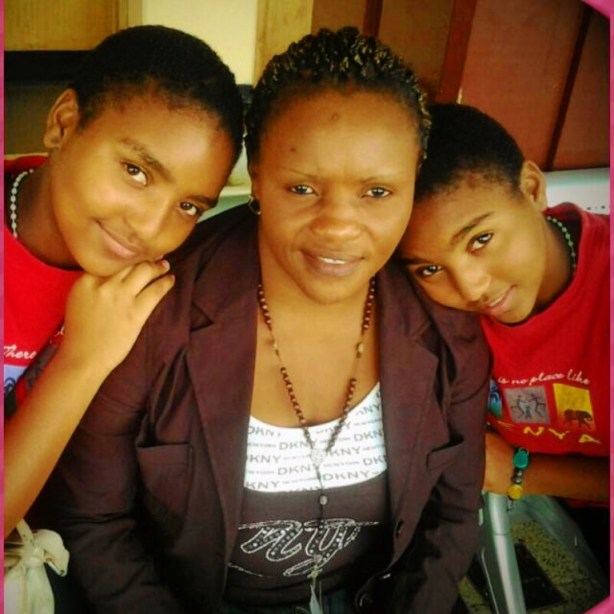 During adolescence, did disability affected the way you perceived yourself as a woman, the ways you were discovering sexuality and your intimate life?
During adolescence, did disability affected the way you perceived yourself as a woman, the ways you were discovering sexuality and your intimate life?
Yes. Disability played a very crucial role in my adolescent life. Within myself, I could not believe I will have a partner who would love me. With cultural beliefs, as well as discrimination, this made me not to believe in myself at all. Thanks to the mainstream school, where I learned that whether disabled or not, we are all equal. Because I was also able to be top of the class, this made my life easier. I start believing that even if I will not have anyone, I will at least get employment that will make me live independently.
I’ve read somewhere that there are many myths about the danger presented by a disabled girl to her matrilineal family if she marries. Could you tell us more about that?
The gender roles play a crucial role in a girl with disabilities in her marriage. The society believes that once a young man marries a girl with a disability, in most cases they fear she might produce a child with a disability too. I remember when I had my first child; people from the man side came on my bed checked on my baby if all her limbs and hands are intact.
The society also feels girl with disabilities cannot fulfill both sexual and household activities, therefore, this makes it very hard for a young woman with disabilities to get married. A young woman with disabilities can find a very good guy to marry, but parents and the society will ridicule him. If the guy is very strong, then marriage takes place. Sometimes it’s even worse when the young girl is brought to the village where she cannot draw water or fetch firewood for the family. In this case, the marriage turns out to be possible only in the city. The Myths surrounding this marriage is that she will bring curses in the family.
Could you point out an experience that drastically changed your life?
When I had my first pregnancy with my first born, I went to the antenatal clinic where the nurse could not attend to me as she could with the other pregnant women. She had unknown fears, she could sometimes ask me silly and demeaning questions like – Eeeish men are bad, lady, who did this to you….? This experienced changed my life for good, to start advocating for the sexual and health rights for women and girls with disabilities
In my husband’s village, there was a time when my husband’s brother passed away and we left the city and went to the village. In normal circumstance, being a woman I was supposed to help in drawing water from the river and fetching firewood. This I could not manage. After the funeral rituals, my husband was told to remain behind, while I went to the city. They sat down discussed that they no longer wanted me. They forced my husband to find a woman who could be doing those chores. In no time, when my husband came back home, after few months I was told he was leaving me and my daughter to marry another woman. This was the most terrible time in my life and it changed my life completely. Even if a guy comes to me and has parents, especially a mother, I would never ever allow him to marry me, because in my case the mother of my husband was the one who influenced him to leave me.
After such hard emotional experiences, I assume it wasn’t easy to open up for a new relationship? How did you manage to overcome that? Where did you meet your second husband?
I met my second husband in one forum, where I was presenting a session on gender-based violence. I explained about how gender-based violence is a root cause of HIV and AIDS and how negative use of the power of men over women demeans men’s dignity. After the session, he followed me through facebook since he took my name during this meeting. We developed our friendship through this forum. I made sure he loved me for who I am and not what I have. I never told him where I stay or what I do. He also never told me what he was doing. He just told me he works in a certain government office; little did I know that he was a military man. After a year of friendship and after discovering that he does not have parents (which was one of my priorities in choosing a life partner taking into account on what happened with me in my previous relationship) I accepted his marriage proposal and we had a very big white wedding. This is one of the breaks through that has also motivated many men to believe in young women with disabilities that they can also be loved and have a family. Parents with girls with disabilities who attended my wedding take it as a starting point to make sure girls with disabilities build a high level of self-esteem. My husband is one of my helpers in advocacy. Whenever he meets a woman or girl with disabilities he makes sure he assists them in any way he can.
Motherhood is also an important issue for women with disabilities, who are often being told by the society that they’re not suitable for the role. What’s your experience? Did you face any difficulties in raising your girls? Was the second pregnancy any different than the first one?
When I had my first born, my husband was there and he was so supportive, but my world crumbled when he was no longer there. I took solace in my prayers and also with my persistence of making sure I achieve my goal. I made sure my child was not discriminated. I made sure I joined groups where my daughter could also make friends who would not discriminate her because she was born from a mother who has a disability. This is often the case in our community. I am so glad now that everyone is taking me and my kids as not a burden, nor as people from another planet. They have seen how my family is respected because of the organization and that I have influenced a lot of groups of people not to discriminate. The second pregnancy was not a big deal, by then I was aware of my rights and much empowered. I was given first class antenatal clinic treatment and the twins were a talk of the town. I can drive a car; I can do anything that all women can do. I have so much support from my family, even the twins are part of my group (they are in high school). Let me leave here I may end up publishing a book of my life. I have so many life experiences, not talking about success stories… plenty.
How would you title the story of your life?
PUSH, and PUSH AND Push UNTIL YOU GET THERE
What was the first job you were paid for?
I worked in the private sector and I was given a room without any accessories for my work as a secretary. This was so demeaning and demotivating. No one believed in me that I could perform.
How did you become an activist for disabled women and girls rights?
When I worked in this first company, I saw that regardless of my credentials I am not put in the same salary segment as my counterparts. I lost my husband to another woman, but later my husband died due to frustrations in his new marriage. When I faced a lot of discrimination in my other new job, which was now a government office… All this prompted me to start my activism work advocating for the rights of women and girls with disabilities.
What’s your own definition of activism?
It is an act of getting involved in doing something that can bring light to myself, to the community, to others who are oppressed in order to achieve a certain goal in one’s life. This also helps to define one’s role in the society that no one is useless regardless of what or who one is, through giving practical or personal experiences or lessons in one’s life that can motivate those who are discriminated against.
In your personal experience, how does gender affect disability and vice versa?
Being a woman with disabilities is a double trouble. This is because society takes women as secondary, disability this puts them in double discrimination and double disadvantaged, unlike the male counterparts. Men with disabilities are more respected and also it’s easier for them to have partners because there is no need for them to do household chores, just as it is the case with women with disabilities. It’s hard to have permanent partners due to being female.
What role does disability play in your identity?
It is a too way identity, one a blessing for being disabled. Because if I wasn’t I couldn’t have known what it means to be someone with disabilities; this, therefore, has given me an identity that has pushed me on to advocate for those who are in my shoes. I identify myself as a strong woman with a disability who does not leave any stone unturned to fight for her rights and those who are oppressed.
On the other hand, it has put me in a very disadvantaged situation because of my persistence of fighting and fighting till I achieve my goal, they call me a very stubborn woman with a disability. I know, because society will always take women with disabilities as useless, but I have made sure my brand as a woman with a disability as I CAN DO ANYTHING, as long as I have proper support surrounding me.
Who’s your strongest support? When you feel down, what inspires you to move on?
My first born daughter is my greatest support. She is at University College, but during holidays she does volunteer in the organization and she is able to work with girls with disabilities and encourages them to move on because she tells them: my mom is my role model. The women and girls with disabilities enthusiasm in advocacy work in the impact areas of our programs – this, therefore, inspires me to go on.
What was your hardest decision in life?
My hardest decision was to start this organization without any funding. And leave my paid job. To get involved in rallies that would, in the end, make me like someone who is very troublesome.
When you started your organization, what was the first project about?
The first project was Economic Empowerment through income generative activities for women and girls with disabilities. The goal was to make sure they are economically empowered so that when we come up with other programs like sexual and reproductive health and rights, they will be able to have informed decisions.
From the moment you started advocacy for disabled women rights, what has changed until this day?
Young women have started believing in themselves, there is an increase in number on those who are getting married and have stable marriages because I am a role model. There’s also a decreased number of those parents who used to keep their girls with disabilities at home, now they are able to send them to school. The service providers in the health sectors have now come to realize that women with disabilities should access friendly health services. The number of rape cases is reduced in the community (this used to be very bad because previously men with HIV and AIDS virus used to rape women and girls with disabilities with the beliefs that they can be cleansed of their diseases). With our advocacy campaigns and awareness, this had been reduced.
What are you most proud of?
I have managed to put women and girls with disabilities in the list of those who are able to live independently through the village banking program that is running in the community. This has reduced women and girls with disabilities begging in the streets and has also improved their lives.
How does it actually work?
Women form groups, the bigger the group the more money they gather and contribute as starting capital. They do compulsory borrowing money at an interest, in return every week they are supposed to come and pay back that loan. After 6 months, they share the profits and then they do business using the money as a revolving fund. This has helped women with disabilities get out of streets begging. Through these groups, they get trained in basic small business management skills, in order to help them calculate profit and loss. Just to motivate them, when the time comes for sharing the profits, the organization awards the woman who hasmodeling programs from those that have managed to succeed in life through different channels.
Which one of your characteristics was crucial for your success?
Perseverance, endurance, tolerance, focused and aggressiveness in a positive way.
Some of your future plans, activist and personal? Is there anything you’ve always wanted to do, but you still haven’t done?
Yes, push for government policies allow girls with disabilities have access to employment opportunities.
When you look back, is there anything you’d like to change or do differently? If yes, what was that?
Yes, I would have first built a network with other organizations that have an interest in our work.
From this perspective, what would you say to 20-year-old-self?
I would say that she must believe in herself and show she can do… Change starts from within… No one can change her, but she can change herself discrimination attitude to a high self-esteem girl to achieve her goal…
How would you like to be remembered?
I would like to be remembered as someone who believed in herself and helped others believe in themselves and did the unthinkable and unbelievable to the human eye.
Anything I didn’t ask and you think is important to add?
I believe that with God everything is possible and when one is surrounded by positive thoughts from peers, friends, family, a girl with disabilities can live a very productive and independent life.
Photos: Mr. Joseph Mbogha & Mr. Charles Chirambo; personal archive
